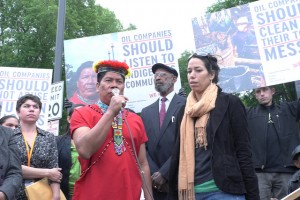
The fallout from Chevron’s annual shareholder meeting continues.
In addition to the protesters outside the meeting, Chevron found itself “under siege” inside the meeting as well, according to the San Jose Mercury News. In fact, it faced something of a shareholder insurrection, as major investors (who collectively manage over $160 billion in assets) accused Chevron management of exercising “poor judgment” and called on the company to rethink its endless litigation strategy in Ecuador.
Chevron, in typically cavalier fashion, dismissed these shareholder concerns. But Sanford Lewis, a lawyer for Trillium Asset Management, one of the institutional investors that signed a letter calling on Chevron’s management to finally settle the Ecuador lawsuit and clean up the Amazon, fired back with a great question Chevron doesn’t seem to have considered:
Chevron spokesman Kent Robertson dismissed the shareholder pressure in an email, saying the company would fight the “fraudulent” award, not settle it.
In 2009, a different company spokesman, Donald Campbell, outlined the oil giant’s legal strategy: “We’re going to fight this until hell freezes over. And then we’ll fight it out on the ice.”
Trillium’s lawyer Sanford Lewis told Courthouse News that this sort of talk makes shareholders uneasy.
“Do they want to go to hell with Chevron?” Lewis asked.
It would seem that Chevron shareholders most certainly do not want to go to hell with the company. New York State Comptroller Thomas P. DiNapoli serves as trustee for the $140 billion New York State Common Retirement Fund, which also signed the letter calling on Chevron to settle with the Ecuadoreans, and he has said: “It’s time for Chevron to face reality. The effects of this horrific, uncontrolled pollution of the Amazon rainforest are still being felt today. Investors don’t derive any benefit from this never-ending courtroom drama.”
Chevron has been anything but forthcoming with its shareholders about the liability it is facing in Ecuador, where the company has been found guilty of massively polluting the Amazon and ordered to pay $18 billion to clean up its mess. The lack of full disclosure has prompted Trillium to file a request with the U.S. Securities and Exchange Commission asking for an investigation into whether Chevron has “appropriately disclosed to its shareholders the scope and magnitude of financial and operational risk” from the guilty verdict in Ecuador.
Thirty-thousand Ecuadoreans are demanding justice in the Amazon. Americans are standing with them. Even Chevron’s shareholders want the company to do the right thing and clean up the Ecuadorean Amazon.
It must be getting increasingly lonely at the top of Chevron.